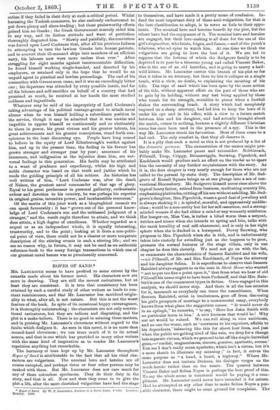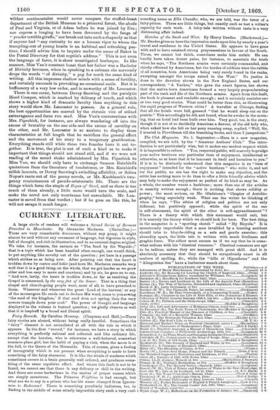ROPES OF SAND.*
Ma. LANCASTE11 seems to have profited to some extent by the remarks made about his former novel. His characters now are more in drawing. They are still the merest caricatures, but at least they are consistent. It is true that consistency has been attained by such a careful study of other writers as leads to con- stant reminiscence, and that Mr. Lancaster has sacrificed origin- ality to what, after all, is not nature. But this is not the worst feature of the book. In spite of its occasional happy extravagance, it is thoroughly uninteresting ; the characters are not only conven- tional caricatures, but they are tedious and disgusting, and the plot is a make-believe. There is no good in mincing these matters, and in praising Mr. Lancaster's cleverness without regard to the faults which disfigure it. As seen in this novel, it is no more than second-hand cleverness ; we can trace much of it to its actual source, and that is one which has provided so many other writers with the same kind of inspiration as to render Mr. Lancaster's repetition anything but remarkable.
The harmony of tone kept up by Mr. Lancaster throughout Ropes of Sand is attributable to the fact that all his chief cha- racters are vulgarians. The nominal hero and heroine are of course excepted, and perhaps three or four other persons may be ranked with them. But Mr. Lancaster does not care much for any of these colourless specimens. They do their duty in the story, and that is all. Now and then they come in to give the plot a lift, after the more cherished vulgarities have had the stage * Ropes of Sand. By W. P. Lancaster, Author of A Screw Loose. 3 vols. London: Bentley. 1869.
to themselves, and have made it a pretty scene of confusion. In- deed the most important duty of these anti-vulgarities, for that is the beat classification to adopt, is to serve as foils to their oppo- nents. The nominal hero and heroine benefit by the plot, but the others have had the enjoyment of it. The nominal hero and heroine are engaged, but their love-making is all done for the use of the girl's stepmother, who faints, feigns, and fusses,—and of the youth's relations, who set spies to watch him. At one time we think the vulgarities are going to have the best of it. We are led to suppose that the fortune of which the Sudgrove family is to be deprived is to pass to a tiresome young cad called Vincent Baker, who is the son of an old harridan, and is going to marry a half- wild kitten. Mr. Lancaster carries this branch of his plot so far that it takes in an attorney, but then he lets it collapse at a single touch, with a view, no doubt, to explaining the meaning of his
title. The rope of sand which has been spun by the mere action
of the tide, without apparent effort on the part of those who are to gain by its holding, without any teat being applied by those who vouch for its strength, crumbles to pieces when a footfall shakes the surrounding beach. A story which had completely imposed on a sharp attorney, had led him to keep the hero of it under his eye and in his office, with a view to a future match between him and his daughter, and had actually brought about the match, comes to nothing, because a slightly different Christian name has once been used in the presence of a spy. This is the way Mr. Lancaster treats his favourites. Most of them come to a bad end. The only comfort is, that they all deserve it.
It is a pity that such a novel as this is not prefaced by a list of the dramatis personx. The enumeration of the names might pro- bably make Mr. Lancaster pause and reconsider. Nobbireach, Pillocalf, Toop, Crippy, Brimeswiggle, Snewing, Pipechick, and Knoblsuch would produce such an effect on the reader as to spare him the necessity of any further acquaintance with the story. As it is, the first chapter is very nearly enough for those who are not called to the perusal by stern duty. The description of Mr. Sud- grove of Russell Square brings us at one plunge into a sea of con- ventional Bloomsbury. Mr. Sudgrove himself never rises above the typical heavy father, retired from business, meditating country life, emphasizing platitudes, cutting off his son without ashilling. Mr. Sad- grove's daughter, Mrs. Pipechick, wears a good deal of jewellery and is always shaking it ; is spiteful, scornful, and oppressively middle- class ; would be a non-entity but for her self-assertion, and a strong- minded woman if she had either a mind or any womanly attributes. Her hanger-on, Miss Van, is rather a blind worm than a serpent, writhes and hisses when she intends to spring and bite, talks with the mock humility of real self-abasement, and is only in her right sphere when she is ducked in a horsepond. Dovey Snewing, who proposes to Mrs. Pipechick when she is rich, and is unfortunately taken into custody for swindling just as she happens to be poor, presents the normal features of the stage villain, only in one chapter he does this cleverly. We need not go on with the list, or enumerate the characteristics of Samson Rainbird and his wife, —nee Pillocalf, of Mr. and Mrs. Knoblauch, of Noyes the attorney and his daughter Selina. It is superfluous to observe that Samson Rainbird always suggests to us the man in Bleak House who wanted "not to put too fine a point upon it," that from what we hear of old Pillocalf his name ought to have been Pecksniff, and that Mrs. Rain- bird is one of the commonest types in fiction. Once engaged in this analysis, we should never stop. And there is all the less occasion for it, inasmuch as everybody can trace the resemblance. When Samson Rainbird, artist in tombstones, goes off from discussing his girl's prospects of marriage to a monumental essay, everybody knows from what place the suggestion comes. "It would never do in an epitaph," he remarks, "to say, 'Here lies John Smith with no particular harm in him.' A nice business that would be Why our art would be ruined. We can roll along in nice antithesis, and no one the worse, such as 'courteous to his superiors, affable to his dependents,' balancing like this for about four lines, and just when the public are getting tired of this vein, we drop for a change into separate virtues, which we proceed to let off like single-barrelled guns,—' cordial, magnanimous, sincere, genuine, apathetic, serene.' You see I don't really mean apathetic, which isn't a virtue, but it's a mere sketch to illustrate my meaning ;" in fact, it serves the same purpose as "a hand, a heart, a highway." Where Mr. Lancaster does not imitate Dickens, his dialogue verges on the mock-heroic rather than on the comic. The quarrel between Vincent Baker and Selina Noyes is perhaps the best proof of this. To say the whole scene is unnatural would be paying it a com- pliment. Mr. Lancaster could never have intended it for nature. Had he attempted at any other time to make Selina Noyes pos- sible character, there might be some ground for complaint. The
wildest sentimentalist would never compare the stuffed-beast department of the British Museum to a primeval forest, the abode of Paul and Virginia, or of Adam before he was joined by Eve ; nor express a longing to have been devoured by the fangs of " yonder terrible giraffe," nor break out into such a rhapsody as that if anyone had "any cariosity to see a human viper to whom the trampling-out of young hearts is an habitual and refreshing pas- time, I should advise him to inquire under the name of Baker in the Postal Directory for that reptile's address." This is not even the language of farce, it is sheer unmitigated burlesque. In like manner, Miss Van's constant boast that her father was a Bachelor of Divinity becomes, when in speaking to a cabman she nervously drops the words "of divinity," a peg for much the same kind of writing. All this impresses shallow minds with a sense of fertility, and certainly succeeds in provoking an occasional smile. But it is buffoonery of a very low order, and is unworthy of Mr. Lancaster.
There is one scene, between Dovey Spewing and the paralytic Hood Comper, which is marked by delicacy of touch, and which shows a higher kind of dramatic faculty than anything in this story would show Mr. Lancaster to possess. As a general rule, the best opportunities are marred by the chronic vice of stilted extravagance and farce run mad. Miss Van's conversations with Mrs. Pipechick, for instance, are always wandering off into the excess of brutality on the one side and the excess of servility on the other, and Mr. Lancaster is so anxious to display these characteristics at full length that he sacrifices the general effect and the movement of his story to a temporary gratification. Everything stands still while these two females have it out to- gether. It is true, the plot is not of such a kind as to make it important that things should not stand still, and if we were not reading of the sound shake administered by Mrs. Pipechick to Miss Van, we should only have in exchange Samson Rainbird's quotations from the literature of tombstones, or Mrs. Rainbird's selfish laments, or Dovey Snewing's swindling affability, or Selina Noyes's rants out of the penny novels, or Mr. Knoblauch's two- penny reminiscences of pseudo-aristocratic life. These are the things which form the staple of Ropes of Sand, and as there is too much of them already, a little more would turn the scale, and make the novel not only wearisome but unreadable. Mr. Lan- caster is saved from that verdict ; but if he goes on like this, he will not escape it much longer.































 Previous page
Previous page